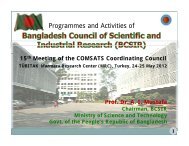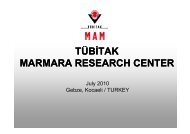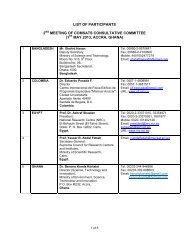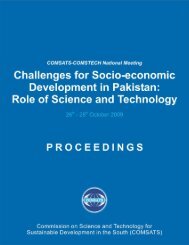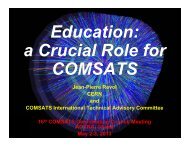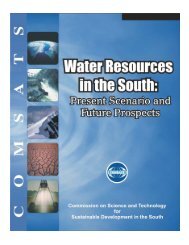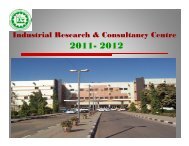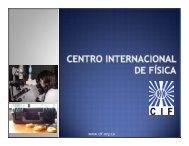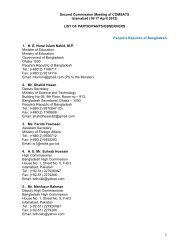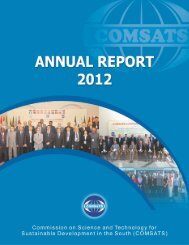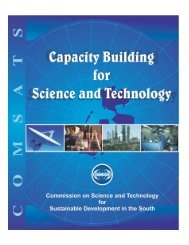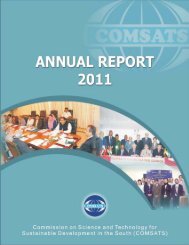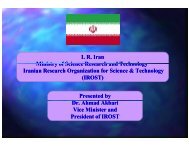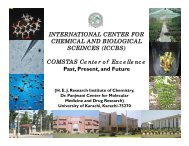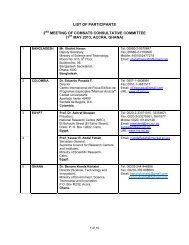Annual Report 2010 - Comsats
Annual Report 2010 - Comsats
Annual Report 2010 - Comsats
You also want an ePaper? Increase the reach of your titles
YUMPU automatically turns print PDFs into web optimized ePapers that Google loves.
TH<br />
COMMUNIQUÉ OF THE 13 MEETING OF<br />
COMSATS COORDINATING COUNCIL<br />
<strong>Annual</strong> <strong>Report</strong> <strong>2010</strong><br />
<br />
<br />
<br />
<br />
<br />
<br />
<br />
<br />
<br />
<br />
The Members of the Council concur that economic progress depends in large part on a nation’s<br />
ability to harness science and technology for addressing wide-ranging socio-economic<br />
challenges. A growing number of countries have recently taken important steps to enhance<br />
indigenous S&T capacity. COMSATS is committed to working with Member States to strengthen<br />
this process.<br />
Investment in S&T must be a cornerstone of strategic planning for long-term prosperity of the<br />
South. The norm of spending on R&D in developed countries, which is 2-3% of GDP, should be<br />
adopted by all States. Encouraging progress made by some Member States of COMSATS in this<br />
respect needs to be emulated by others.<br />
An essential component of S&T capacity building is human resource development, for which the<br />
policy-makers should devise ambitious plans. Political will plays a key role in the successful<br />
implementation of these plans. Members of COMSATS’ Council reiterate their commitment to<br />
provide state-of-the-art research and training facilities to scientists from COMSATS Member<br />
States and, in general, to cooperate in the sharing of science and technology whenever and<br />
wherever feasible.<br />
The ultimate objective of developing or adapting scientific and technological solutions is to help<br />
society by promoting industrial productivity, food security, public health, environmental<br />
conservation, energy supplies and advanced communication. COMSATS’ S&T Centres of<br />
Excellence are engaged in R&D activities to address such issues. The strengthening of the<br />
Centres’ infrastructures and facilities by national authorities will make international collaboration<br />
more effective, leading to more rapid achievement of the desired goals.<br />
The existing institutional infrastructures for R&D in the South require review and upgrading. A<br />
national evaluation mechanism for achieving maximum performance at par with international<br />
standards is an essential component of research productivity. The success achieved among<br />
different members of the COMSATS Network in this regard is a matter of great satisfaction and<br />
could serve as a model for others.<br />
COMSATS Coordinating Council Members realize that global scientific advances are taking place<br />
at a breathtaking pace and that new fields of study – for example, in the biological and materials<br />
science – are gaining prominence. To keep abreast with such emerging fields in science and<br />
technology will require the creation of new institutions and new collaborative scientific ventures.<br />
To advance the interests of developing countries in commerce, trade, environment, security and<br />
international stability, cooperative efforts are indispensable. Realizing the importance of research<br />
collaboration, members of the COMSATS’ Council resolve to establish Thematic Research<br />
Groups for technical cooperation with the participation of clusters of countries within the<br />
membership of COMSATS. The groups would undertake research projects in selected areas of<br />
high socio-economic impact, including ICTs, agriculture and biotechnology, materials science,<br />
mathematical modeling, environmental studies and space technologies.<br />
In view of the significance of scientific meetings and training workshops, COMSATS’ Council<br />
members will also make earnest efforts to hold at least one scientific activity every two years for<br />
scientists from COMSATS’ Member Countries, and to participate in scientific events under this<br />
arrangement taking place in other Member Countries.<br />
International fora devoted to South-South cooperation in S&T, including COMSATS, deserve the<br />
greatest financial support possible by the respective Member States. Adequate funding for<br />
organizations, such as COMSATS, is indeed in the best interest of the States.<br />
The Council calls upon the scientific communities in their countries to redouble their efforts to<br />
achieve excellence in their respective areas of expertise, request their governments to accord the<br />
highest priority to S&T capacity building, and earnestly call upon the world leaders to help achieve<br />
scientific progress throughout the globe. To achieve these lofty goals will require both political and<br />
financial commitments from governments and international collaboration and a willingness on the<br />
part of the scientific community to conduct research in society’s interest.<br />
8



